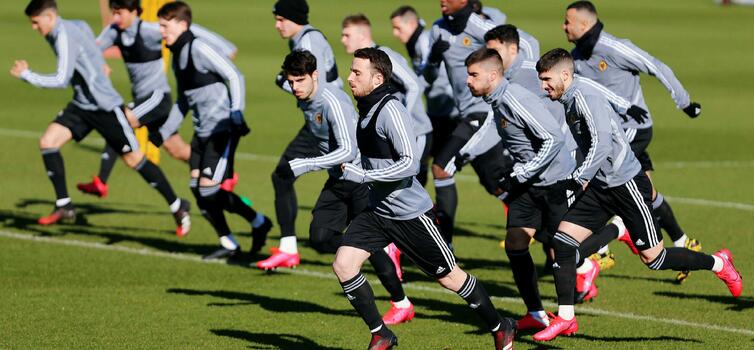Tackling is back: Inside Stage Two of Project Restart

Premier League teams resumed contact training yesterday
Written by Simon Austin — May 29, 2020
PREMIER LEAGUE clubs resumed contact training yesterday, with Championship sides due to follow suit from next Tuesday. All have been aided by detailed guidance on permitted drills from the Premier League's Football Department.
Top tier teams voted for Stage Two of Project Restart - “the resumption of interaction within the two-metre social distancing boundary, where pairs, small groups and/or teams will be able to interact in much closer contact" - on Wednesday.
Yesterday, Championship clubs were sent the EFL's draft contact training guidance and “once the final version is released and clubs have submitted their updated (training) policies" they will be able to resume with Stage Two.
This means close contact training is likely to resume in the Championship on Tuesday, although League One teams are still waiting in the absence of a testing programme.
TGG has seen the EFL's Stage Two guidance, which is largely the same as that of the Premier League - and is extremely detailed. It includes a 21-page "risk assessment and training design guidance" document put together by the Premier League Football Department, which outlines how the duration of a session, pitch size and number of players involved can impact contact time during a drill. You can see an example below.

The Premier League has also commissioned tracking data supplier Second Spectrum to run analysis of contact time during the 288 games in the competition so far this season.
This research found that, on average, a player would be in close contact (of less than two metres) for about 39 seconds with another particular player in a typical match. More than 98% of players had less than five minutes of close contact time with another player, and 99.98% had less than 15 minutes.
The Project Restart Working Group presented its Stage Two protocols to Premier League Sporting Directors, managers and doctors earlier this week, before a meeting of shareholders on Wednesday that unanimously passed the guidance. This meant a return to close contact training for clubs yesterday.
There has also been a general acceptance of the guidance from players, with Watford captain Troy Deeney, who had decided to stay at home for Stage One because of concerns about the health of his young son, announcing his intention to return to training next week.
There have been concerns that BAME players such as Deeney are more susceptible to coronavirus, which is specifically addressed in the EFL guidance.
It states: “The most up-to-date data suggests that a 20-year old BAME player would have no greater a risk than that of a 26-year old non-BAME player.
“Another way to look at this is if 100,000 footballers contracted COVID-19 in the next five years, fewer would die from the condition than would in car accidents.
“But the risks for both BAME and non-BAME Players is very low given their age, fitness levels and overall good health.”
There have also been concerns that players could be at more risk when training or playing at high intensity. “There is not yet enough data on heavy and high respiratory rates. However, it is very unlikely to be a risk factor, especially when outdoors,” the EFL said.
As with Stage One, there is an emphasis on social distancing outside of technical sessions and good hygiene. Players have to arrive at training already changed and shower at home, while gyms and other communal areas remain closed.
“Other measures to reduce infection spread aside from good hygiene and social distancing include avoiding spitting, chewing gum and use of snus (chewing tobacco),” the EFL said.
A risk assessment must be undertaken by clubs before Stage Two commences, “looking at how training grounds, facilities, treatments and, in particular training sessions and drills can be adapted to minimise close contact.”
Players and key training ground staff are being coronavirus tested twice a week, with Hong Kong-based Prenetics undertaking the programme for the Premier League and Leicestershire's Nationwide Pathology doing so for the EFL.
If there are three or more positive tests at one club within a testing round then the league’s medical advisers must be notified.






-1.png)





